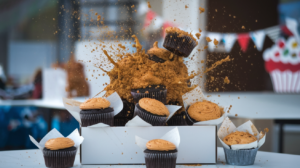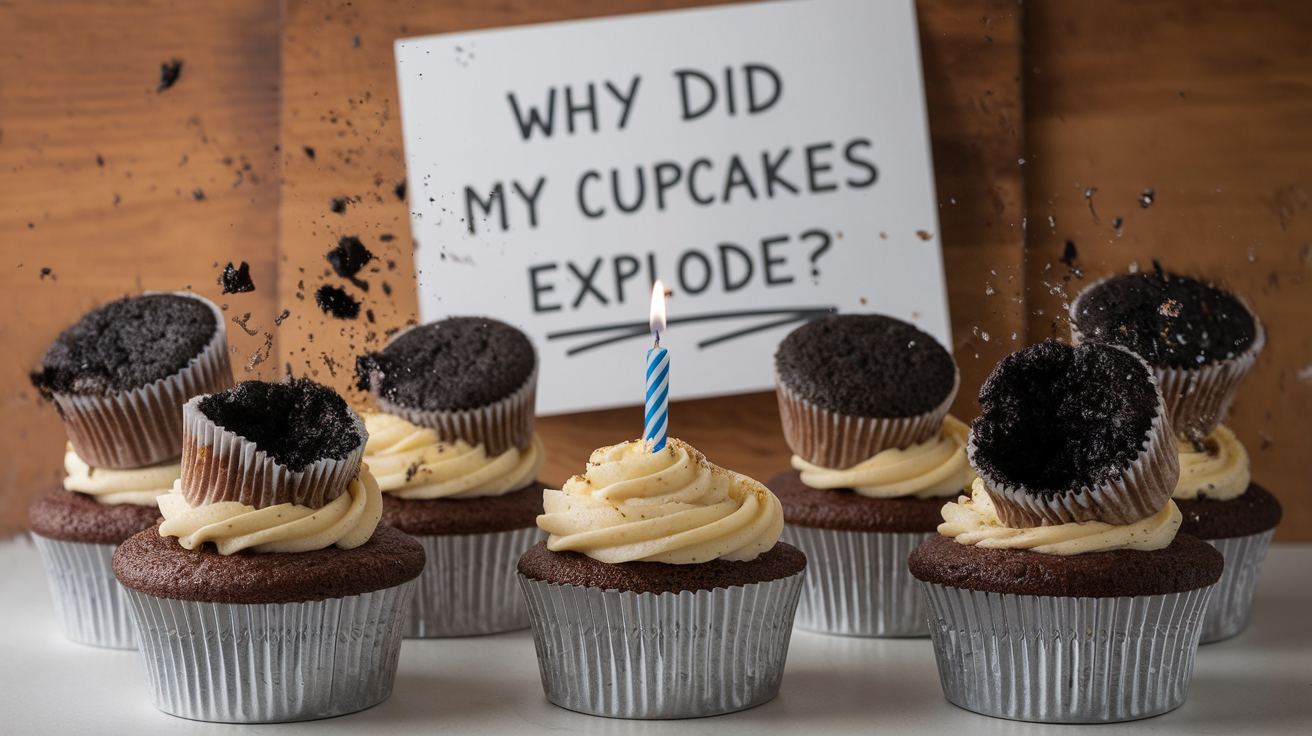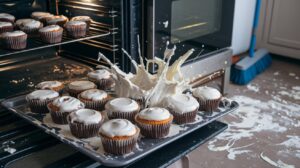Introduction: Why Do Cupcakes Explode?
Baking cupcakes should be a fun and rewarding experience, but it can quickly turn frustrating when you open the oven to find that your cupcakes have exploded. Instead of the fluffy, perfectly rounded treats you were expecting, you’re left with a mess of overflowing batter and burnt edges. If you’ve ever found yourself asking, “Why did my cupcakes explode?” you’re not alone.
Understanding the reasons behind this common baking mishap is key to preventing it in the future. In this guide, we’ll explore the science behind cupcake explosions, identify common mistakes, and provide you with actionable tips to ensure your cupcakes come out perfect every time. Whether you’re a novice baker or have years of experience, this guide will help you troubleshoot and refine your baking process.
Before we dive into the specifics, if you’re looking for additional cupcake baking tips, be sure to check out How to Stop Cupcakes from Doming for advice on achieving flat-topped cupcakes.
The Science Behind Exploding Cupcakes
To prevent cupcake explosions, it’s essential to understand the science of baking. Several factors can contribute to this issue, including ingredient ratios, oven temperature, and mixing techniques.
- The Role of Leavening Agents
Leavening agents like baking powder and baking soda are responsible for making cupcakes rise by creating gas bubbles in the batter. However, if these agents are not used correctly, they can cause the batter to expand too quickly, leading to an explosion.- Baking Powder: A double-acting leavening agent that reacts twice—once when mixed with wet ingredients and again when exposed to heat. If too much is used, the batter can rise rapidly, causing it to overflow and explode.
- Baking Soda: Requires an acidic ingredient (like buttermilk or vinegar) to activate. If there’s too much baking soda or not enough acid, the reaction can be too intense, leading to similar results.
- Oven Temperature: A Critical Factor
Oven temperature plays a significant role in how cupcakes bake. If the temperature is too high, the outside of the cupcakes will set too quickly while the inside continues to expand, often leading to an explosion. Conversely, if the temperature is too low, the cupcakes may not rise properly, resulting in a dense texture.- High Temperature: Causes the batter to set on the edges while the center continues to rise, leading to overflow and a possible explosion.
- Uneven Heat Distribution: Inconsistent oven temperatures can also contribute to exploding cupcakes. Hot spots in your oven can cause some cupcakes to rise faster than others, leading to uneven baking.
- Overmixing the Batter
The way you mix your batter can significantly impact the outcome. Overmixing incorporates too much air into the batter, which can cause the cupcakes to rise too quickly and then collapse or explode.- Air Incorporation: Overmixing introduces more air into the batter. While some air is necessary for a light, fluffy texture, too much can cause instability.
- Gluten Development: Overmixing also develops the gluten in the flour too much, resulting in a tougher texture and uneven rising.
Incorrect Ingredient Ratios
Baking is a science, and even small deviations from a recipe’s ingredient ratios can lead to problems. Too much or too little of certain ingredients, such as flour, sugar, or liquid, can cause your cupcakes to behave unpredictably in the oven.
- Flour-to-Liquid Ratio: An imbalance between flour and liquid can cause the batter to be too thick or too thin, affecting how it rises and bakes. Too much liquid can cause overflow, while too much flour can make it dense and prone to explosion.
- Sugar Content: Sugar affects the structure and browning of cupcakes. Too much sugar can cause the cupcakes to caramelize and expand too quickly.
Common Causes of Exploding Cupcakes
Now that we’ve covered the science behind cupcake explosions, let’s take a closer look at the most common causes and how to prevent them.
- Too Much Leavening Agent
One of the most common reasons for exploding cupcakes is using too much baking powder or baking soda. If the recipe calls for a specific amount, it’s essential to measure it accurately.- Tip: Always use a level teaspoon or tablespoon when measuring. Double-check your measurements before adding them to the batter.
- High Oven Temperature
Baking at too high a temperature is another common culprit. Try lowering the oven temperature by 25°F (about 15°C) to see if that helps. A lower temperature allows the cupcakes to rise more slowly and evenly.- Tip: Use an oven thermometer to ensure your oven is at the correct temperature. Even slight variations can affect how your cupcakes bake.
- Overfilled Cupcake Liners
Filling your cupcake liners too much can lead to overflowing and exploding cupcakes. Make sure to leave enough room for the batter to rise without spilling over.- Tip: Fill your cupcake liners no more than two-thirds full.
- Overmixing the Batter
Overmixing can introduce too much air into the batter, leading to instability during baking.- Tip: Use a spatula to fold in dry ingredients rather than a mixer, which can overmix the batter.
- Using Cold Ingredients
Cold ingredients can cause uneven mixing and temperature distribution in the batter, leading to unpredictable rising. Ensure that ingredients like eggs, butter, and milk are at room temperature before mixing.- Tip: Take your ingredients out of the fridge 30 minutes before baking to ensure they reach room temperature.
Step-by-Step Guide: What to Do If Your Cupcakes Explode
If your cupcakes have exploded, don’t worry. By following these troubleshooting steps, you can identify the problem and adjust your technique for better results next time.
- Review Your Recipe
Start by reviewing the recipe you’re using. Ensure that you’re following it precisely, especially when it comes to the ratios of leavening agents, flour, and liquid.- Tip: If you’re adapting a recipe, such as making it gluten-free, be mindful that ingredient substitutions can affect how the cupcakes rise and bake.
- Adjust Your Oven Temperature
If your cupcakes are exploding, try lowering your oven temperature by 25°F (about 15°C). A lower temperature allows the cupcakes to rise more slowly and evenly.- Tip: Place your oven thermometer in the center of the oven to get the most accurate reading.
- Mix the Batter Correctly
Overmixing can introduce too much air, leading to explosive cupcakes. Mix the batter just until the ingredients are combined.- Tip: Use the “folding” technique to gently incorporate dry ingredients into the wet mixture.
- Fill the Cupcake Liners Appropriately
Avoid overfilling the cupcake liners. Fill them no more than two-thirds full to give the batter enough room to expand.- Tip: Use a cookie scoop or ice cream scoop to portion the batter evenly.
- Use Room Temperature Ingredients
Cold ingredients can cause uneven mixing and affect how the cupcakes rise.- Tip: If you forget to take your ingredients out of the fridge ahead of time, you can quickly warm them up by placing eggs in warm water or microwaving milk or butter on low power.
Preventing Exploding Cupcakes: Best Practices
Now that you’ve identified the potential causes of exploding cupcakes, let’s discuss some best practices to prevent this issue in the future.
- Follow the Recipe Exactly
Baking is a precise science, so follow the recipe exactly.- Tip: If you’re experimenting with new ingredients or techniques, make only one change at a time.
- Preheat Your Oven
Always preheat your oven to the correct temperature before baking. This ensures that the cupcakes start baking immediately and rise evenly.- Tip: Preheat your oven for at least 15-20 minutes to ensure it reaches the correct temperature.
- Use Fresh Leavening Agents
Old baking powder or soda can lose potency, leading to unpredictable rising.- Tip: Test baking powder by mixing 1 teaspoon with 1/2 cup hot water. If it bubbles vigorously, it’s still good. Test baking soda by mixing 1/4 teaspoon with 1 tablespoon vinegar.
- Bake on the Middle Rack
The placement of your cupcake pan in the oven affects how evenly the cupcakes bake.- Tip: Bake on the middle rack to ensure even heat distribution.
- Allow for Proper Cooling
After baking, let the cupcakes cool in the pan for a few minutes before transferring them to a wire rack.- Tip: Don’t leave cupcakes in the pan too long, as this can cause them to sweat and become soggy.
FAQs About My Cupcakes Explode

- Why Did My Cupcakes Overflow?
Overflowing cupcakes are often the result of overfilling the liners or using too much leavening agent. Make sure to fill your liners no more than two-thirds full and measure your leavening agents accurately to prevent overflow. - Can I Still Eat Exploded Cupcakes?
Exploded cupcakes may not look pretty, but they are usually still edible. You can trim the burnt edges and use them in a trifle, cake pops, or another dessert that doesn’t require perfect presentation. - How Do I Know If My Oven Temperature Is Correct?
An oven thermometer is the best way to ensure your oven is at the correct temperature. Place the thermometer in the center of the oven and adjust the temperature settings as needed based on the thermometer’s reading. - Can I Prevent Explosions When Using Gluten-Free Flour?
Gluten-free baking can be tricky, as gluten-free flours often require more leavening agents to achieve the same rise as traditional flours. Be mindful of your ratios and consider reducing the leavening agents slightly to prevent explosions. - Should I Use Cupcake Liners or Grease the Pan?
Cupcake liners help contain the batter and reduce the risk of overflow and explosions. If you’re not using liners, make sure to grease the pan thoroughly and monitor the batter fill level closely.
Conclusion: Why Did My Cupcakes Explode?
Baking cupcakes can be a delicate balance of science and art. If you’ve ever experienced the frustration of exploding cupcakes, you’re not alone. By understanding the underlying causes—whether it’s too much leavening agent, high oven temperature, overmixing, or incorrect ingredient ratios—you can make the necessary adjustments to prevent future disasters.
Remember, baking is all about precision, so don’t be discouraged if your first attempt isn’t perfect. With practice, attention to detail, and the tips outlined in this guide, you’ll soon be baking cupcakes that rise beautifully without any explosions.
Whether you’re baking for a special occasion or just for fun, mastering the art of perfect cupcakes will bring joy to your kitchen and delight to your taste buds. For more delicious baking tips, visit How to Stop Cupcakes from Doming and explore other troubleshooting techniques.



